Eleanor Arnason's Blog, page 16
March 15, 2015
Today
Today is the Ides of March, I just realized. Yesterday was Pi Day, which friends celebrated with pies. And Terry Pratchett died 3 days ago, after suffering from a form of early dementia for several years. He was 66, too early to go.
He was a wonderful writer, someone I read for comfort, because his books are funny and charming and sane and well written, and he was the master of the fiction footnote. His footnotes don't work in e-versions of his novels, because they are put at the back of the book. They need to be at the bottom of the page, because they are part of the story. They are a great way to add information and comments that are too tangential to be in the text, except maybe enclosed in parentheses.
Anyway, a lovely writer and a loss to humanity.
He was a wonderful writer, someone I read for comfort, because his books are funny and charming and sane and well written, and he was the master of the fiction footnote. His footnotes don't work in e-versions of his novels, because they are put at the back of the book. They need to be at the bottom of the page, because they are part of the story. They are a great way to add information and comments that are too tangential to be in the text, except maybe enclosed in parentheses.
Anyway, a lovely writer and a loss to humanity.
Published on March 15, 2015 09:14
SFF and LIterary Writing
The following is in response to an essay in Esquire, "How Genre Fiction Became More Important Than Literary Fiction."
First, a passage from the essay:
Then my comments:
First, a passage from the essay:
"The landscape of realism has narrowed. If you think of the straight literary novels of the past decade—The Marriage Plot, The Interestings, The Art of Fielding, Freedom—they often deal with stories and characters from a very particular economic and social position. Realism, as a literary project, has taken as its principle subject the minute social struggles of people who have graduated mainly from Ivy League schools."
Then my comments:
Decades ago I was reading the novels of Alice Adams and Laurie Colwin. They are both good writers in a New Yorker way. At a certain point, I think while reading Colwin, I realized I was reading about the emotional problems of people with trust funds. So I went back to science fiction.I need to set myself a test. How long can I go without mentioning Iceland or the Icelandic sagas? How long can I go without mentioning my own writing?
I suppose I could see the current literary situation as the triumph of science fiction, with all these elite literary writers pillaging SFF for ideas. I don't like it, though I have no trouble with the triumph of SFF in popular culture. I suppose I ought to see a therapist re my dislike of the American upper middle class and their art. I want them to keep their sticky fingers off my beloved space ships and trolls.
What I remember about Adams at this distance in time was -- her writing had some tics that bothered me. She began too many sentences and paragraphs with 'and.' If the 'and' is actually needed, use a semi-colon instead of beginning a new sentence. Most of the time, it wasn't needed. It was there to make the style sound smoother. No. Never use words that are not needed.
Come to think of it, my ideas of style are probably shaped -- at least in part -- by the Icelandic sagas, which have a very spare style. Though they have a couple of interesting tics of their own. The sagas love prepositions, as do Minnesotans. Why say 'take hold' when you can say 'take hold of?' And like Minnesotans, the saga writers use a lot of pointer words. I don't know what the right term for these are. Words like 'there' and'then.' 'That's a nice car (or sword) you have there.' 'So how did you like the concert (or battle) then?'
Published on March 15, 2015 08:07
February 26, 2015
Old Venus
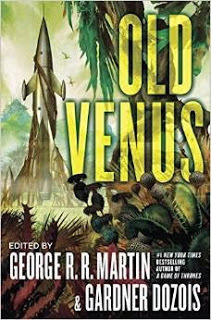
I have a story in the anthology, which is why I'm posting this. I have read a review, and it genuinely sounds like a good group of stories by an impressive group of writers. I always like being in good company.
Published on February 26, 2015 09:42
February 25, 2015
Re the story "Moby Quilt"
This is a reply to Timothy, who commented that he liked"Moby Quilt."
"Quilt" is the fourth Lydia Duluth story. All four have been published. The first, "Stellar Harvest," was a Hugo finalist and maybe a Nebula finalist. I no longer remember. Anyway, it's in one of the Nebula Awards collections, edited by Kim Stanley Robinson. In addition, there are three stories set in the Lydia Duluth universe, but not about Lydia Duluth. All of these have been published. One, "Knapsack Poems," was a Nebula finalist and has been reprinted several times.
There are three more unpublished Lydia Duluth stories, which I'd like to get out to editors in the next month or so.
The final plan is a collection titled The Adventures of Lydia Duluth, which would include all ten stories. But first I have to get the hwarhath collection out.
Published on February 25, 2015 08:16
February 24, 2015
Privilege and Weather
And maybe I should let go of 'privilege.' It's apparently useful for other people.
Outside, there's a clear blue sky and a lot of sunlight. Predicted high of 30, which is pretty warm. The rest of the week the highs are going to be below freezing and above zero. No snow forecast. I really could use some snow -- not eight feet, like Boston, but maybe six inches and then a series of light dustings to keep the snow white.
Outside, there's a clear blue sky and a lot of sunlight. Predicted high of 30, which is pretty warm. The rest of the week the highs are going to be below freezing and above zero. No snow forecast. I really could use some snow -- not eight feet, like Boston, but maybe six inches and then a series of light dustings to keep the snow white.
Published on February 24, 2015 08:28
February 23, 2015
Several Thoughts on Privilege by Me from Facebook
I am thinking about privilege, a word I am not crazy about. I suppose it's useful. It comes from the Latin for 'private' and the Latin for 'law.' It means a law passed for or against a private citizen. Now, per Merriam Webster, it means (1) a right or benefit that is given to some people and not to others
(2) a special opportunity to do something that makes you proud
(3) the advantage that wealthy and powerful people have over other people in a society.
I'm seeing it used mostly as definition # 1, though I think a number of people are blending definition # 1 and definition # 3. This makes sense, given the fact that Americans have a really poor sense of class, which also make sense. For generations Americans have been told that we are all middle class. Or at least all white people are middle class. We do see people of color as different. This is especially true of African Americans. They are seen as poor and probably criminal, even if wearing a three piece suit and a Phi Beta Kappa key. I find this unbelievable, but it's obviously true. Large numbers of Americans -- including, apparently, most cops -- cannot see class markers. I've seen this confusion in action at panels I moderated at SF cons. A discussion of race and class is close to impossible, since -- here in the US -- race is code for class and class is code for race.
I don't know where this thought is going, except talking about issues of privilege is this blurry mess is not easy.
*
I am old enough so I can remember when it was assumed that most Americans would have food, shelter, clothing, medical care, transportation and enough money to get their kids through college. It was not called privilege. It was called having a union job. When you call a decent life, earned by hard work, privilege you are doing the Koch Brothers' work for them.
*
I don't like the p-word because it's fuzzy and because it replaces the idea that all people have a basic right to a decent life with some kind of weird hierarchy of suffering. You are privileged because your life is better than the lives of some other people, even if your life is maybe not so great. At the same time privilege means, per one dictionary, "a right, immunity, or benefit enjoyed only by one person beyond the advantages of most: the privileges of the very rich." (This is one of several definitions, that blur together and make it hard to be sure what we are talking about.) So it's possible, using this word, to slide from 'at least I don't live in a war zone' to 'break out the caviar.'
(2) a special opportunity to do something that makes you proud
(3) the advantage that wealthy and powerful people have over other people in a society.
I'm seeing it used mostly as definition # 1, though I think a number of people are blending definition # 1 and definition # 3. This makes sense, given the fact that Americans have a really poor sense of class, which also make sense. For generations Americans have been told that we are all middle class. Or at least all white people are middle class. We do see people of color as different. This is especially true of African Americans. They are seen as poor and probably criminal, even if wearing a three piece suit and a Phi Beta Kappa key. I find this unbelievable, but it's obviously true. Large numbers of Americans -- including, apparently, most cops -- cannot see class markers. I've seen this confusion in action at panels I moderated at SF cons. A discussion of race and class is close to impossible, since -- here in the US -- race is code for class and class is code for race.
I don't know where this thought is going, except talking about issues of privilege is this blurry mess is not easy.
*
I am old enough so I can remember when it was assumed that most Americans would have food, shelter, clothing, medical care, transportation and enough money to get their kids through college. It was not called privilege. It was called having a union job. When you call a decent life, earned by hard work, privilege you are doing the Koch Brothers' work for them.
*
I don't like the p-word because it's fuzzy and because it replaces the idea that all people have a basic right to a decent life with some kind of weird hierarchy of suffering. You are privileged because your life is better than the lives of some other people, even if your life is maybe not so great. At the same time privilege means, per one dictionary, "a right, immunity, or benefit enjoyed only by one person beyond the advantages of most: the privileges of the very rich." (This is one of several definitions, that blur together and make it hard to be sure what we are talking about.) So it's possible, using this word, to slide from 'at least I don't live in a war zone' to 'break out the caviar.'
Published on February 23, 2015 06:38
February 17, 2015
Previous Book
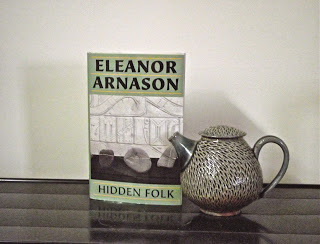
Here is a photo of the previous book, which came out in December. The teapot is by Rachael Hoffman-Dachelet.
I am uncomfortable doing self-promotion. I figure it will be easier if I promote someone else's work as well.
Published on February 17, 2015 15:10
From Aqueduct Press
Three early novels by Eleanor Arnason
I'm pleased to announce that Aqueduct Press has just issued e-book editions of three, out-of-print novels by Eleanor Arnason: The Sword Smith, To the Resurrection Station, and Daughter of the Bear King. Each includes a new afterword by Eleanor.
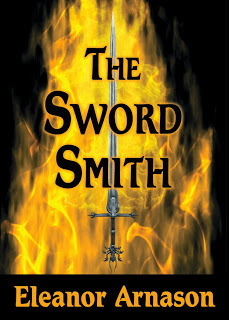
The Sword Smith tells the tale of Limper, a master sword smith running from an oppressive boss-king who forced him to make expensive junk, and Nargri, his young dragon companion. Written in the early 1970s, and published in 1978 by Condor, The Sword Smith is an anti-epic fantasy. In a new Afterword written for this edition, Arnason describes the characters as "mostly fairly ordinary people, rather than heroes, wizards, and kings. Their problems are ordinary problems, rather than a gigantic struggle between good and evil. There is no magic. The dragons are intelligent therapod dinosaurs, and the trolls are some kind of hominid, maybe Neanderthals. In many ways, it is a science fiction story disguised as a fantasy."
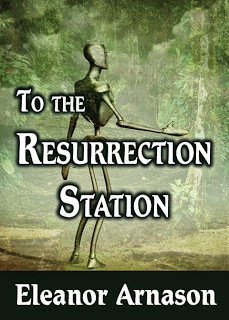
To the Resurrection Station, Arnason's second novel (written in the 1970s), was first published in 1986. On a planet far from our Earth, it begins a Gothic tale: a moldering mansion full of secrets, a disturbing master of the house, a young and innocent heroine, and the mansion's robot servant, who drives the story. A motley crew escapes to Earth (now overrun by interesting intelligent machines, except for a clearly crazy spaceport) where they land and begin exploring the ruins of New York City.
In a new Afterword written for this edition, Arnason describes Resurrection Station as about people who can't fit into social roles. "Claud can't be a traditional Native. Belinda can't be a straight young woman or a traditional heroine. Shortpaw is not an acceptable giant mutant rat. Without being especially heroic, they all refuse to give in or give up."
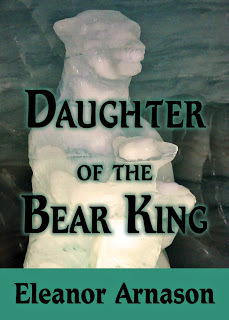
Not your everyday fantasy, Daughter of the Bear King clearly arises from Second Wave Feminism. A middle-aged woman discovers that she has a role in an epic struggle between shoddiness and integrity. And her battle flows across time and universes.
On a Monday morning, Esperance Olson is suddenly transported to another world where dragons fly and wizards divulge her heritage: daughter of the ancient Bear King, she is a shape-changer with magical powers. This strange world runs on magic, and the wizards have summoned Esperance to fight a creeping and shadowy menace. Her epic journey transports her back and forth between her birth world and Minneapolis, where the magic and monsters follow, wreaking havoc.
Samples of each book are available for free download at Aqueduct's site, where the books are available in both epub and mobi formats for $7.95.
I'm pleased to announce that Aqueduct Press has just issued e-book editions of three, out-of-print novels by Eleanor Arnason: The Sword Smith, To the Resurrection Station, and Daughter of the Bear King. Each includes a new afterword by Eleanor.

The Sword Smith tells the tale of Limper, a master sword smith running from an oppressive boss-king who forced him to make expensive junk, and Nargri, his young dragon companion. Written in the early 1970s, and published in 1978 by Condor, The Sword Smith is an anti-epic fantasy. In a new Afterword written for this edition, Arnason describes the characters as "mostly fairly ordinary people, rather than heroes, wizards, and kings. Their problems are ordinary problems, rather than a gigantic struggle between good and evil. There is no magic. The dragons are intelligent therapod dinosaurs, and the trolls are some kind of hominid, maybe Neanderthals. In many ways, it is a science fiction story disguised as a fantasy."

To the Resurrection Station, Arnason's second novel (written in the 1970s), was first published in 1986. On a planet far from our Earth, it begins a Gothic tale: a moldering mansion full of secrets, a disturbing master of the house, a young and innocent heroine, and the mansion's robot servant, who drives the story. A motley crew escapes to Earth (now overrun by interesting intelligent machines, except for a clearly crazy spaceport) where they land and begin exploring the ruins of New York City.
In a new Afterword written for this edition, Arnason describes Resurrection Station as about people who can't fit into social roles. "Claud can't be a traditional Native. Belinda can't be a straight young woman or a traditional heroine. Shortpaw is not an acceptable giant mutant rat. Without being especially heroic, they all refuse to give in or give up."

Not your everyday fantasy, Daughter of the Bear King clearly arises from Second Wave Feminism. A middle-aged woman discovers that she has a role in an epic struggle between shoddiness and integrity. And her battle flows across time and universes.
On a Monday morning, Esperance Olson is suddenly transported to another world where dragons fly and wizards divulge her heritage: daughter of the ancient Bear King, she is a shape-changer with magical powers. This strange world runs on magic, and the wizards have summoned Esperance to fight a creeping and shadowy menace. Her epic journey transports her back and forth between her birth world and Minneapolis, where the magic and monsters follow, wreaking havoc.
Samples of each book are available for free download at Aqueduct's site, where the books are available in both epub and mobi formats for $7.95.
Published on February 17, 2015 08:15
Love Poems (and a Novel)
Patrick and I went to Barnes and Noble Sunday, so I could buy him the new Samsung nook for his birthday. While we were there, I bought a notebook for myself, because it was on sale and had WRITE on the cover. Always good advice. And I bought a translation of Neruda's 20 Love Poems and a Song of Despair. I had looked at it before and passed on it. I love Neruda, but I worried about his love poems. I've now read three or four of the poems. The problem is, he describes the woman as a landscape. I get no sense of a person. These poems were written long ago, when Neruda was a mere kid, so I will forgive him. But love poems that treat the loved one as a thing are creepy.
I can't remember ever thinking of Patrick as a landscape. I usually think of him as a cute, funny, clever, crabby person. (I added crabby, so you won't think I am uncritical.) I put him in a novel (To the Resurrection Station, now out in e-version) as an intelligent giant mutant rat, still a person.
If you think I am pitching To the Resurrection Station, you are right. The rat is named Shortpaw. At least one person who knows Patrick says it is a true portrait.
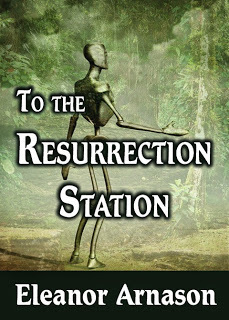
I can't remember ever thinking of Patrick as a landscape. I usually think of him as a cute, funny, clever, crabby person. (I added crabby, so you won't think I am uncritical.) I put him in a novel (To the Resurrection Station, now out in e-version) as an intelligent giant mutant rat, still a person.
If you think I am pitching To the Resurrection Station, you are right. The rat is named Shortpaw. At least one person who knows Patrick says it is a true portrait.

Published on February 17, 2015 08:08
February 15, 2015
Postscript to the Vanishing Women Post
One of my friends thought the comparison to Hollywood (in my vanishing women post) is wrong. New SFF writers don't get attention because they were young and foxy. They get attention because they are hip and the next big thing. This sounds correct. I withdraw the comparison to Hollywood.
Published on February 15, 2015 08:42
Eleanor Arnason's Blog
- Eleanor Arnason's profile
- 73 followers
Eleanor Arnason isn't a Goodreads Author
(yet),
but they
do have a blog,
so here are some recent posts imported from
their feed.



